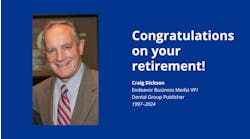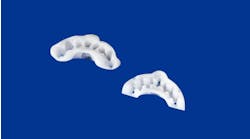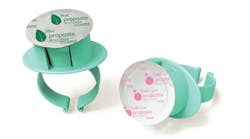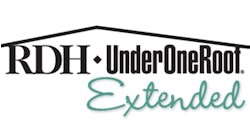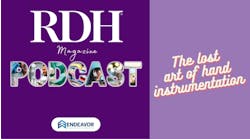BY DIANNE GLASSCOE WATTERSON, RDH, BS, MBA
Dear Dianne,
I work in multiple practices, and we handle appointments after SRP very differently. Two of my offices say that after SRP the patient will be on periodontal maintenance for life. If they ever accidentally get charged for a prophy, the insurance will always deny the claim if we later charge out for periodontal maintenance. The other office wants the hygienists to charge out a D1110 prophy at the six to eight week visit and then alternate the codes every other time.
Do you know for sure that insurance will pay for the periodontal maintenance visit after you charge out for a D1110? We were always taught in school, that once a patient undergoes SRP, he or she will always be periodontal maintenance.
Also, I temped in an office where the patient's insurance would pay for a partial denture but not a fixed bridge. The patient actually got a bridge, but the front desk charged out for a partial just to get the insurance to pay. Is this legal or fraudulent?
Tammy, RDH
Dear Tammy,
Let's begin by looking at the descriptor for D4910: "This procedure is instituted following periodontal therapy and continues at varying intervals, determined by the clinical evaluation of the dentist, for the life of the dentition or any implant replacements. It includes removal of the bacterial plaque and calculus from the supragingival and subgingival regions, site specific scaling and root planing where indicated, and polishing the teeth. If new or recurring periodontal disease appears, additional diagnostic and treatment procedures must be considered."
If we read this descriptor in the proper context, it does not say that the patient should be relegated to having periodontal disease forever. It does say that there should be ongoing clinical evaluation by the dentist for as long as the patient has teeth or implants.
-----------------------------------------------------
Other articles by Watterson
- Protocol for gingivitis patients: Due to a lack of insurance codes, are we taking shortcuts with gingivitis?
- Paralysis in a practice: Keep the dentist motivated about dentistry
- Avoid overwhelming patients: Too many dental treatment recommendations?
-----------------------------------------------------
If you had a disease for which you were treated and you recovered, would it be fair to keep treating you as if you had a disease? The fact is many of our patients get better and stay better after definitive periodontal care. Some have erroneously used the analogy that periodontal disease is like diabetes, in that it is not curable, but is this analogy accurate? Not according to Dr. Gary Greenstein, practicing periodontist and professor in the department of periodontology at the University of Medicine and Dentistry of New Jersey. In an article titled, "Periodontal Diseases are Curable," that was published in the August 2002 issue of the Journal of Periodontology, Dr. Greenstein states: "Some therapists believe that periodontal diseases are chronic diseases and not curable, rather they are maintainable illnesses. However, this line of reasoning fails to recognize that most patients with periodontal diseases attain periodontal health after therapy at the vast majority of sites. The need for maintenance post-treatment is an important aspect of optimizing long-term success, but recognition of this fact does not justify characterizing periodontal diseases as incurable ... The belief that chronic periodontitis is incurable in the presence of health after periodontal therapy seems contradictory. Maintenance may be an extension of active therapy, but the absence of disease after treatment fulfills the criteria for health and curability."
Dr. Greenstein makes it clear in his article that ongoing maintenance can be a necessary component of high quality care. But he poses the question of why would we characterize periodontal disease as incurable? Dr. Greenstein discusses the classification of periodontal disease back in the 1990s as a "chronic" disease, which, in medical terms, denotes something that is not curable, which is clearly not the case with periodontal diseases. He states that, if disease continues after definitive care, it is possible that the treatment provided was inadequate to control disease progression. We know that periodontal diseases require certain numbers of pathogens (called threshold) in order to progress. Plus, there are other modifying factors-environmental, acquired, and/or genetic-that influence disease progression.
The recurrence of disease after definitive therapy depends on the quality of therapy provided, the patient's individual host response, level of oral hygiene, and various risk factors. Also, people can become reinfected after experiencing a season of good health.
I think the key to deciding on appropriate care should be based on patients' individual needs. Some patients do get better and are appropriately maintained with a prophy, whereas some do not. Some have overwhelming risk factors, such as smoking or diabetes, and may never reach stability in which a prophy would be sufficient care. We should judge case by case.
As far as insurance is concerned, there are so many nuances among the different providers that I don't think it is possible to say "for sure" about anything. Some payers will only cover D4910 for a set period of time after SRP, such as two to three years. Some payers recommend alternating between the codes. Some do not. Some payers will only cover D4910 in the case of osseous surgery. Some payers do not reimburse D4910 at all. Some plans will provide more benefits for pregnant or diabetic patients.
What we know is that periodontal diseases are episodic in nature. If the patient's periodontal status improves to a state of good health after treatment, then providing follow-up care in the form of a prophylaxis may be appropriate. However, that judgement call should not be made until a reasonable time of stability is demonstrated, usually one to two years.
The ADA addressed the question several years ago as to whether a patient can go back to a prophy at some point following definitive periodontal care, stating the treating dentist should make that decision. Unfortunately, there has been so much fraud with regard to dental insurance that the bad guys have made things difficult for those of us who try to be honest.
If the dentist, in consultation with the hygienist, decides the patient can be maintained with a prophy, then D4910 would be discontinued. If signs of disease recur, then the patient would need to undergo more definitive therapy and subsequently be placed back into periodontal maintenance. It is possible to request the alternative benefit of D1110 if D4910 is not a covered benefit.
Regarding your second question about the legality of reporting to a third party payer one procedure when in reality a different procedure was performed, this is blatant fraud. Dr. Charles Blair, author of an excellent coding manual titled, "Coding with Confidence," states that coding correctly may result in a decrease in revenues, but it could keep the doctor out of jail. Practices can be audited even if the practice does not participate with a particular plan. Any payer has the direct or indirect right to verify that the procedure was:
• Actually performed
• Medically necessary
• Reported accurately with the correct code
• Performed to the standard of care
• Billed at the same fee as non-insurance patients
• Not improperly upcoded or unbundled
Business assistants who knowingly participate in upcoding schemes are also subject to prosecution and jail time. The law is clear: Code for what was done, period.
For insurance questions, it behooves every dental practice to have a business assistant that knows and understands the nuances of the various plans used by their patients. Such a person can prevent insurance misunderstandings. RDH
All the best,
Dianne
DIANNE GLASSCOE WATTERSON, RDH, BS, MBA, is an awards winning speaker, author, and consultant. She has published hundreds of articles, numerous textbook chapters, an instructional video on instrument sharpening, and two books. For information about upcoming speaking engagements or products, visit her website atwww.professionaldentalmgmt.com. Dianne may be contacted at (336)472-3515 or by email [email protected].
